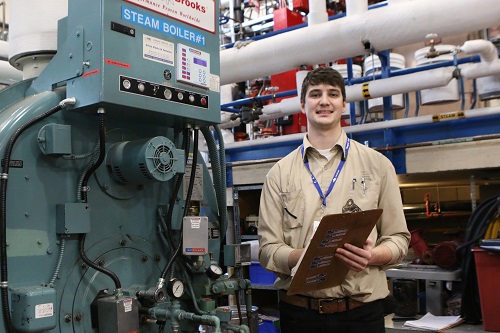 Tuesday, April 23, 2024
Tuesday, April 23, 2024  Tuesday, April 23, 2024
Tuesday, April 23, 2024 
Power engineers aren’t the most visible people in our workforce, but the reality is, the world can’t operate without them.
“Without power engineers, life as we know it would be disrupted,” says David Babich, Vancouver Island University (VIU) Power Engineering Chair. “People never see us, but we are there 24/7, 365 days a year, providing the essential services behind the scenes that keep our buildings warm in winter, cool in the summer, powered up and running.”
Power engineers maintain the power plants in hospitals, pulp mills, refineries, manufacturing plants, and virtually all large buildings across the cities and towns we live in. They also work in water treatment plants, food production facilities, textile plants and many other industries.
According to the Institute of Power Engineers (IPE) the average age of today’s power engineer is about 45 and there are fewer graduates than there are job vacancies, which means demand is only going to increase. On Vancouver Island there are more than 300 employed power engineers at about 40 companies.
Since 2012, almost 300 students have graduated from VIU’s Power Engineering/Process Operator – 4th Class Program. Canada has five levels of certification for power engineers, with fifth being the lowest, and first at the top.
“The Canadian power engineering training material designed by Pan Global and used at VIU is rated the best in the world,” says Babich, who has 48 years of field experience in a variety of industries from pulp mills to textile manufacturing facilities all around the world.
After successful completion of the 32-week program, which includes 10 weeks in class and 12 weeks out in the field, graduates can expect to make anywhere from $30-40 an hour, depending on the industry they enter into. A first class power engineer can earn upwards of $200,000 per year.
First-year power engineering student Eli Gaucher is currently at Cowichan District Hospital completing his first practicum in the field.
“I am really enjoying the opportunity to broaden my knowledge,” says Gaucher. “My class time at VIU has been phenomenal and practicum has taught me there is always so much more to learn. He adds, “If you’re looking for a career in the trades and not really sure what you want to do, power engineering is a great place to start. There are so many opportunities to advance in the field and find a job somewhere you like. You’re not going to be disappointed.”
Babich says graduates are working in a variety of sectors across the industry, from oil and gas production to corn chip and potato chip factories in Alberta.
“Today’s power engineers are being trained in environmentally friendly, renewable and sustainable energy systems such as solar power and geothermal power plants,” he adds.
The flexibility of shift work is something Elaine Zaplotinsky welcomes, along with a good mix of physical and mental tasks. Zaplotinsky is a shift engineer in the heating plant at CFB Comox working four days on, four off. She landed a job there after fulfilling her practicum at the air force base through VIU, and they helped her obtain her 2nd class Power Engineering certificate.
“Going into power engineering was the best decision I have ever made,” says Zaplotinsky. “It changed my world and my income has more than doubled. I am hopefully in line to become the chief of the plant when the boss retires. My income by that time will have tripled.”
Zaplotinsky came to VIU at the age of 40. She had spent 20 years working in and being a partner in an automotive parts supply company. Following a divorce she found herself looking for a new career.
“I tried bookkeeping and accounting but I hated it,” says Zaplotinsky. “As a little girl, I was always helping my dad rebuild stuff in the basement, that was who I was and I realized I couldn’t spend my life in an office.”
A career in trades intrigued Zaplotinsky, but she was terrified of being an electrician, didn’t want to become a plumber and was looking for a job she could physically do up to retirement, so she set her sights on becoming a power engineer. In her role in the heating plant, which supplies the steam heat for all of the buildings on the base, as well as the sterilization needs at the hospital and for food preparation, she checks the boilers, runs water tests and adds chemicals as needed.
VIU is gearing up for the next intake of future power engineers in March 2020.
“I am very pleased to announce that we have 10 paid practicums lined up for prospective students at a variety of industries here on Vancouver Island,” says Babich.
The next publication deadline is Friday at noon
Join Construction Links Network